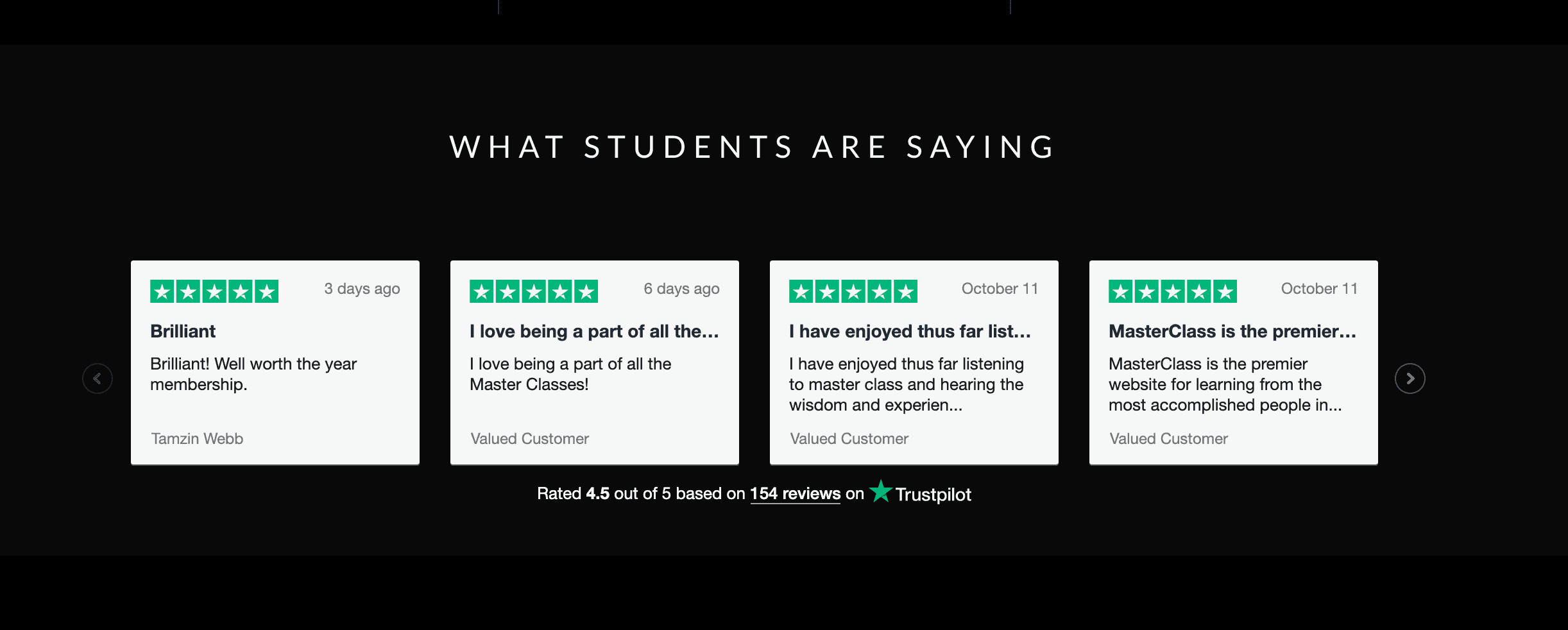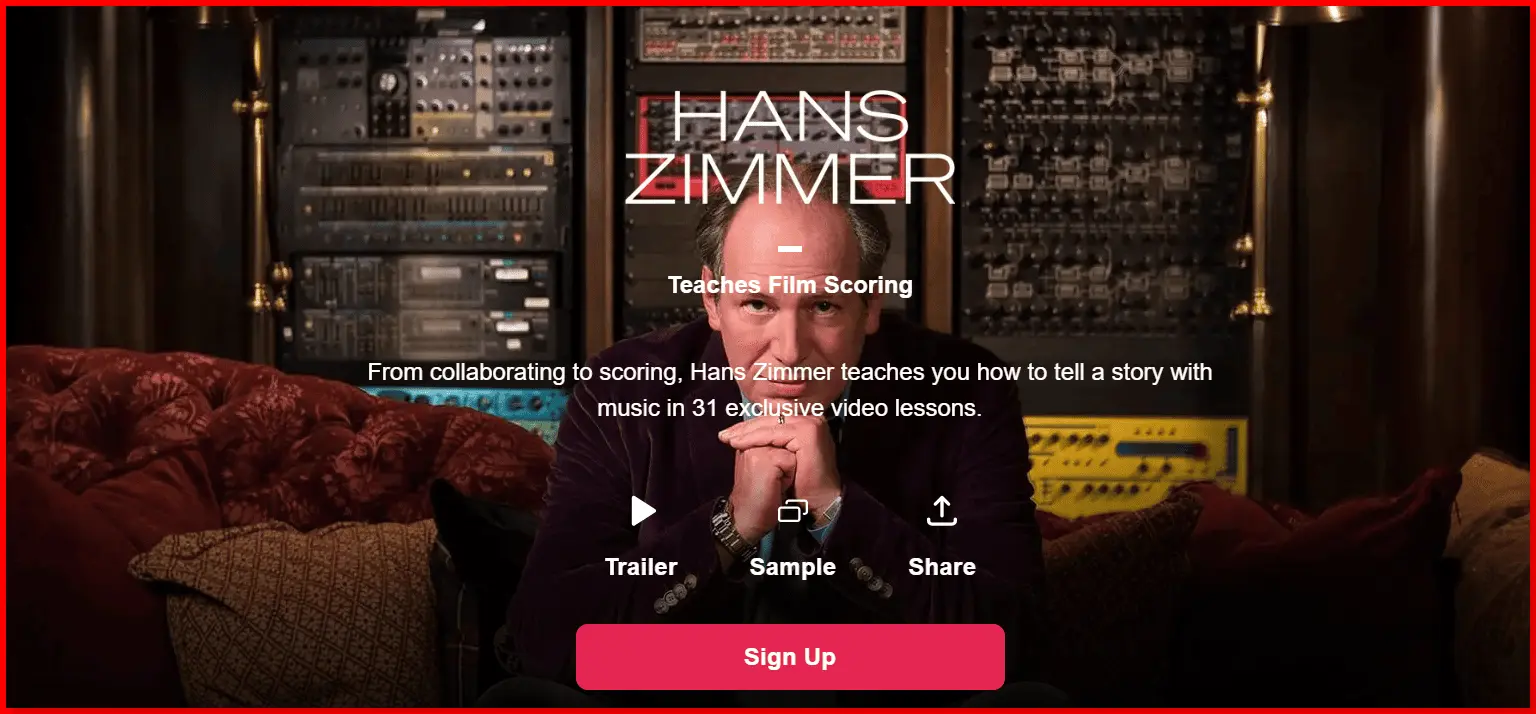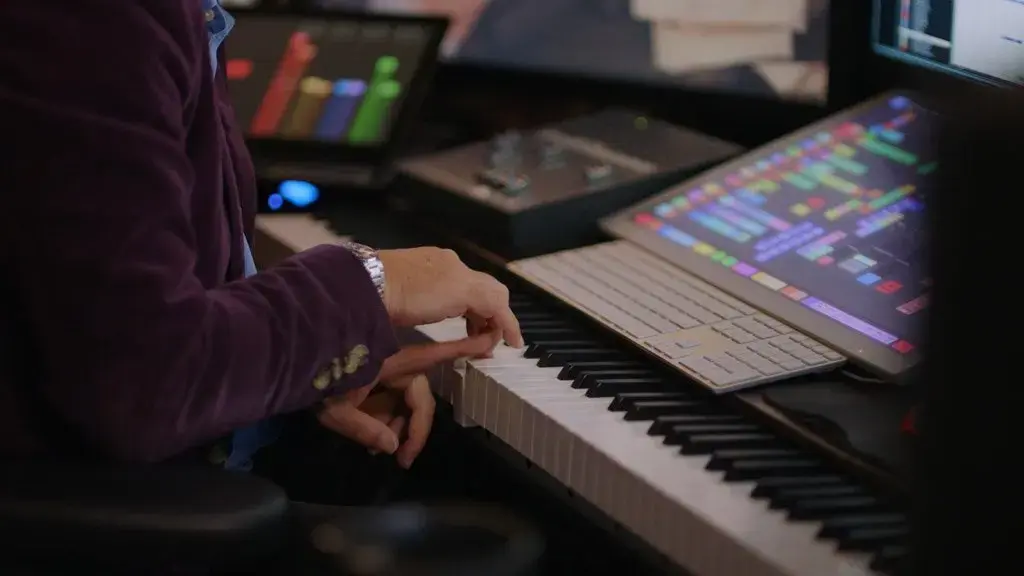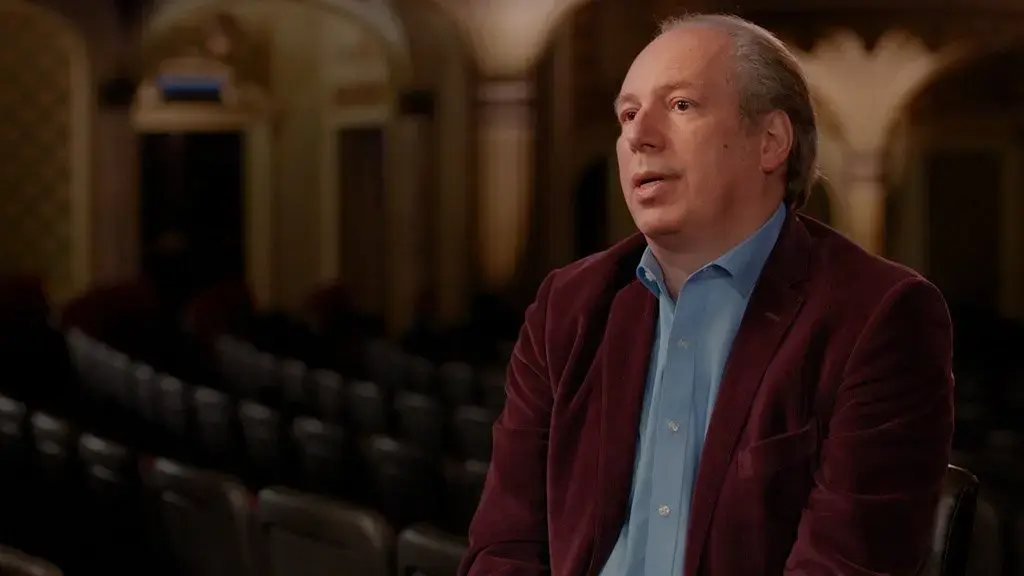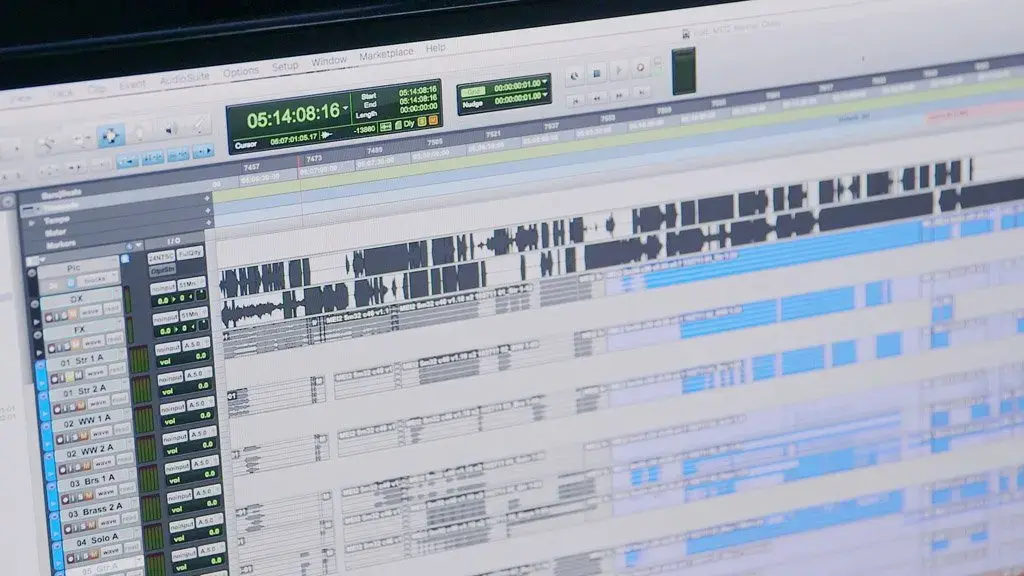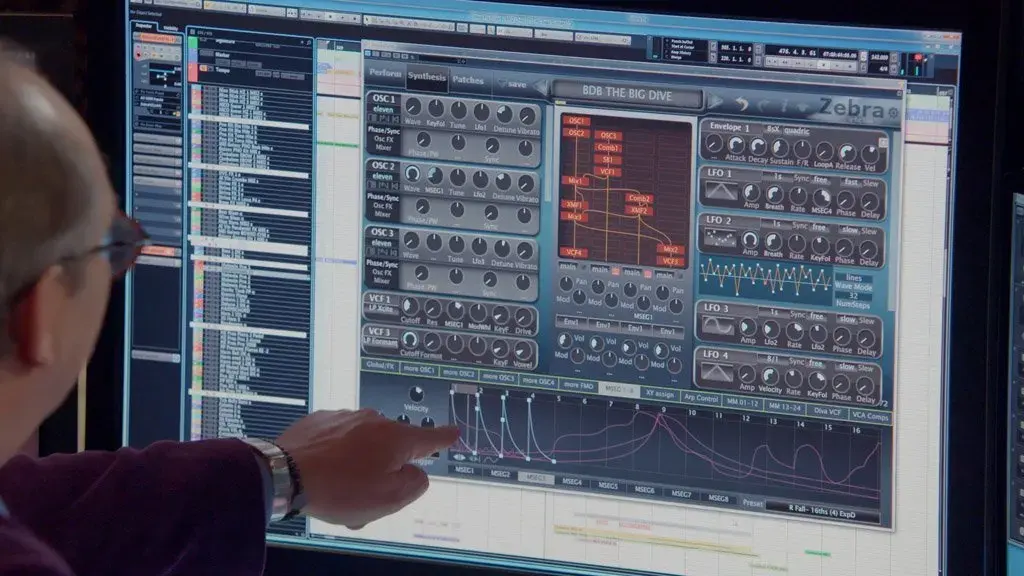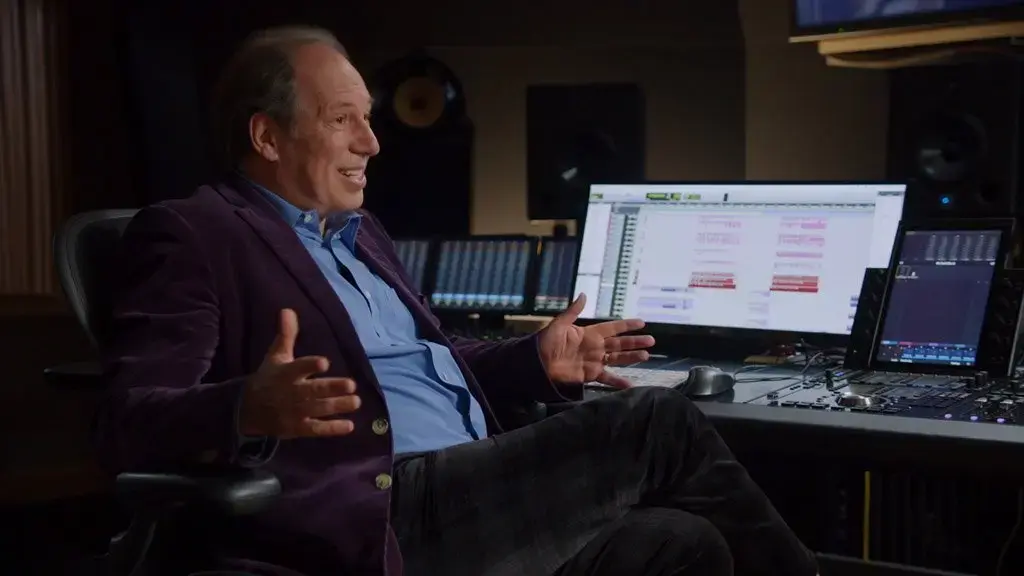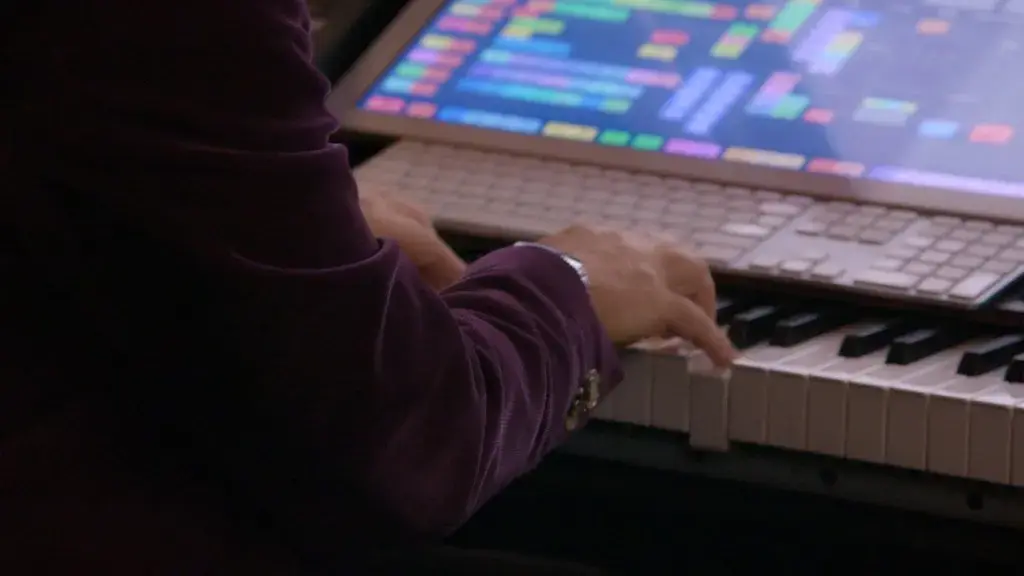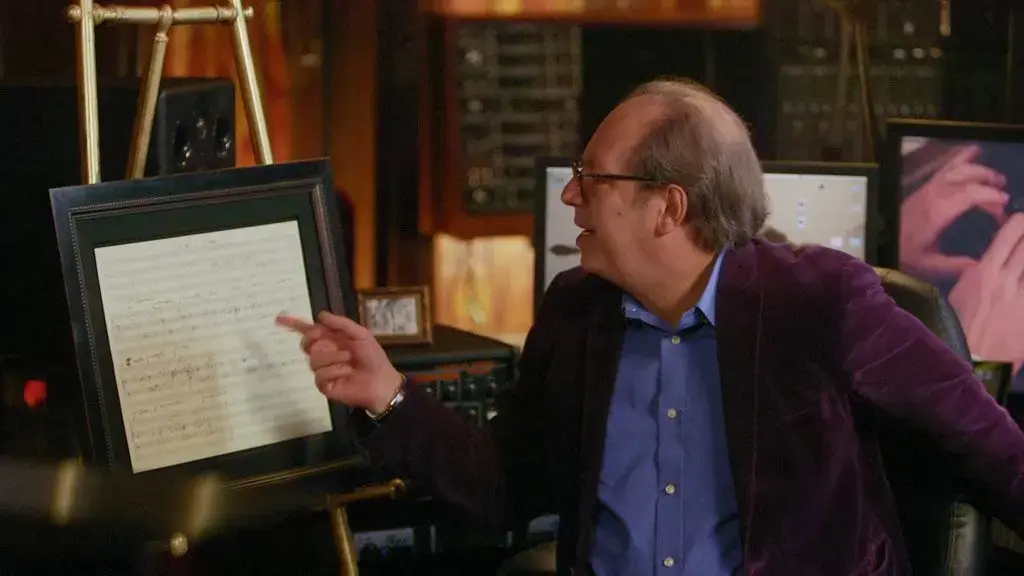Ever wondered what it’s like to learn music from a real Hollywood legend? That’s exactly what I did with the Hans Zimmer MasterClass! I’m just an average person who loves music, and I was super curious about this class. You know Hans Zimmer, right?
He’s the genius behind the music of movies like “The Lion King” and “Pirates of the Caribbean.” So, when I got the chance to dive into his MasterClass, I was both excited and a bit nervous. Would it be too hard for me?
Would I understand the lessons? In this review, I’ll share my honest experience, focusing on whether this class is worth it for regular folks who aren’t professional musicians but are passionate about music.

Table of Contents
Hans Zimmer Masterclass Review
| Aspect | Details |
|---|---|
| 🎓 Course Name | Hans Zimmer MasterClass |
| 👨🏫 Instructor(s) | Hans Zimmer |
| ⏱️ Class Length | 31 video lessons (5 hours 40 minutes) |
| 🎨 Category | Arts & Entertainment, Music |
| 🎯 Who is this Course for | Music composers, film score enthusiasts, Hans Zimmer fans |
| ⌛ Time Duration | 5 hours 40 minutes |
| ⭐ Rating | 8.5 out of 10 |
| 💰 Pricing | $180 (Masterclass All-Access Pass) |
| 🌟 Overall Experience | An insightful and inspiring course, offering a deep dive into film scoring with industry insights from Hans Zimmer. Ideal for those passionate about music, composition, and film. |
About Hans Zimmer
Hans Zimmer is one of the greatest music composers in recent times.
Ever since the 1980s, he has been giving his music, a part of his soul, to the filmmakers, and his music has been one of the biggest standpoints of the film as well. Music composition was never as fun as it is, with Hans Zimmer scoring the background music.
It becomes very important for a film to have the right kind of music because if that’s not the case, the movie has a great chance of falling flat on its face.
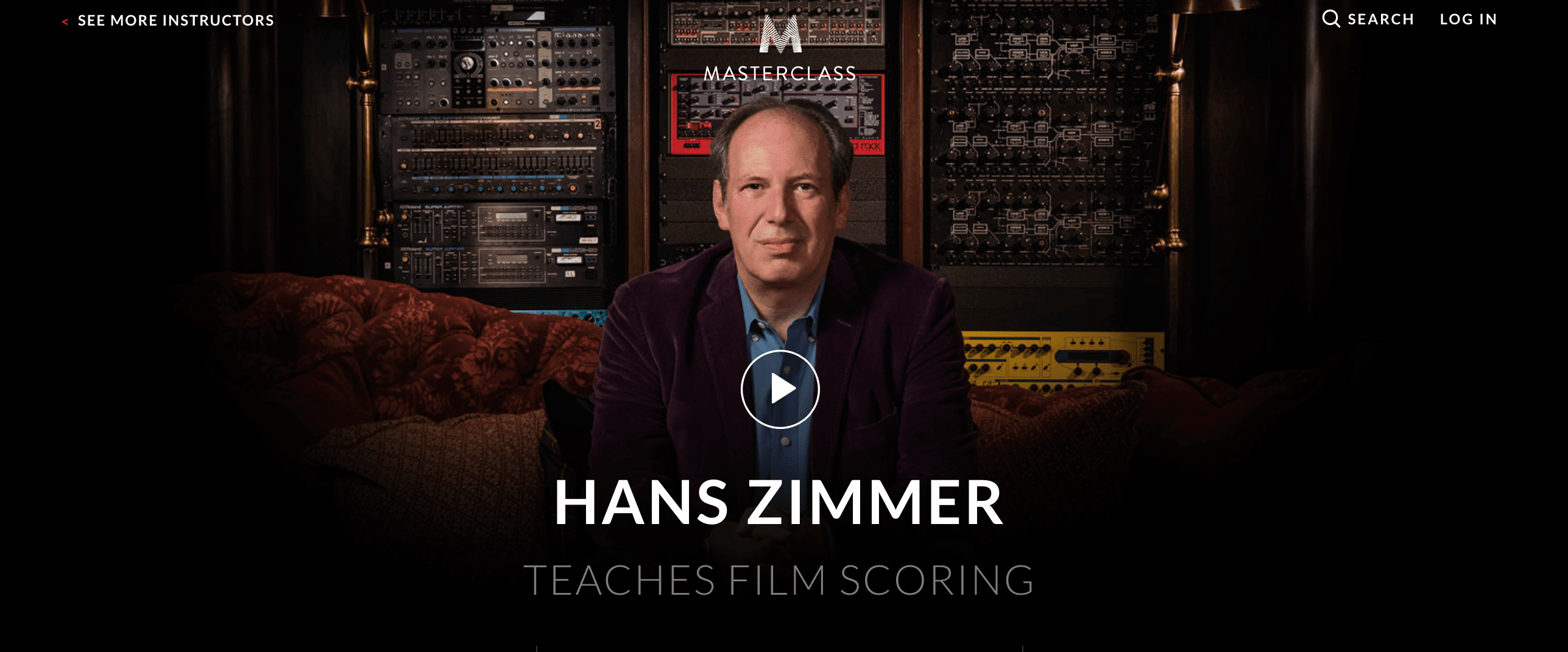
Hans Zimmer has scored for some of the greatest hits in the past few decades.
Whether we talk about The Lion King, Pirates of the Caribbean, The Dark Knight, and of course, the most infamous background score of his, Inception, each film has done wonders at the box office and in the hearts of the people but what has stayed and glued to them is the background music of the film.
People can still memorize the music of all these films. In fact, the music score of these films has acted as an inspiration for many other music composers from various parts of the world.
Inception’s music has been channeled to different versions in so many films across the globe that you can easily call this film’s music a cult classic of its own. The film was a great thriller, but what made it work even better with the people was its music score!
Hans Zimmer MasterClass
The MasterClass is an institute founded by Hans Zimmer himself, where he teaches music scores for films.
Most filmmakers and film producers all across the globe do not understand what music to use in the film and how much music will be used.
There are various parameters to music. It’s not as easy as it might look. There are a lot of hurdles in making good music that has a good rhythm and suits the concept of the film as well.
It’s not like you randomly produce music; there are a lot of aspects that need to be taken into account before a film comes out with its music.
The music is the backbone of a film.
If the music isn’t good, no matter how amazing the storytelling or the acting is, you will find it difficult to cope with the film. However, if the case is otherwise, you will root for the film quickly, and the film will catch your attention as well.
Masterclass shares the main aspects related to music for an economical price, which anyone who is interested in music and wants to score the music for the films can afford.
Hans Zimmer is not only a good composer but a really good teacher as well.
That’s why Masterclass becomes an even more effective tool for understanding music since Hans Zimmer will tell you the major aspects of music scores in films in detail.
It will help you much more than anything else, and you might even land somewhere down the road with great music in a film. One doesn’t even know his destiny anyway.
Inside Hans Zimmer’s MasterClass
This film score MasterClass is one of the most extended courses currently offered on MasterClass, coming in at well over 5 hours of watch time. It is one of the most extended courses now accessible on MasterClass.
You will also have access to a 55-page PDF work notebook that contains supplemental reading and tasks in addition to the video classes.
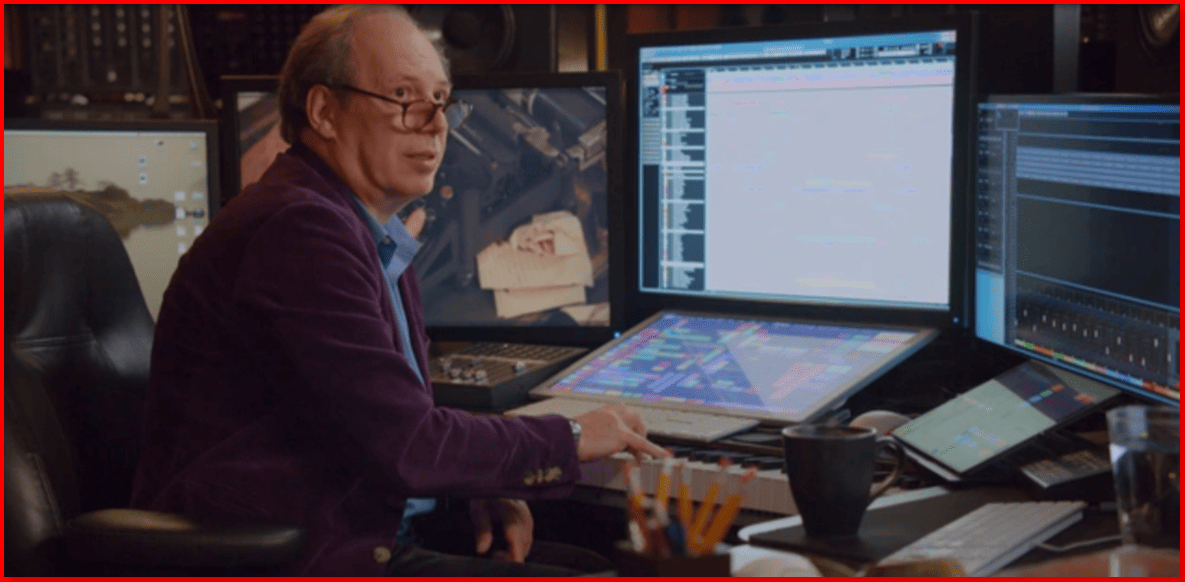
I’ve divided the training into the following seven primary parts:
- Getting to Know Your Professor
- Putting Points on the Board
- Putting Together the Music Parts
- Case Studies in the Process of Developing the Character Theme
- Collaboration With Various Musicians
- A Look Into the Life of a Musician
To go through each and every lesson would take a significant amount of time; therefore, in order to provide you with a comprehensive review of this training program, I will focus on the most important takeaways from each and every class.
So, let’s get started:
What Can We Learn From Hans Zimmer’s Masterclass?
There are a lot of things that you can learn from the Masterclass.
When a music composer, who is as legendary as Hans Zimmer teaches you a thing or a couple, you can make a lot out of it for sure. Masterclass helps you not only grow as a music composer but it helps you to love music even more.
Hardly anyone in this world doesn’t connect to this music. Most people love music, and they can feel the music and its intensity.
Thus, if you create the music stressing how much you love it, it will be communicated without words to the audience who’s going to hear that music. Hans Zimmer explains how you need to feel the music.
Not only do you have to feel the music from your own perspective, but you need to feel the music from the audience’s perspective as well.
Lessons In Masterclass
The masterclass has been divided into 31 different lessons.
These lessons will help you to become a music composer or at least understand music better, which will also help you create a product for yourself that you so very much desire.
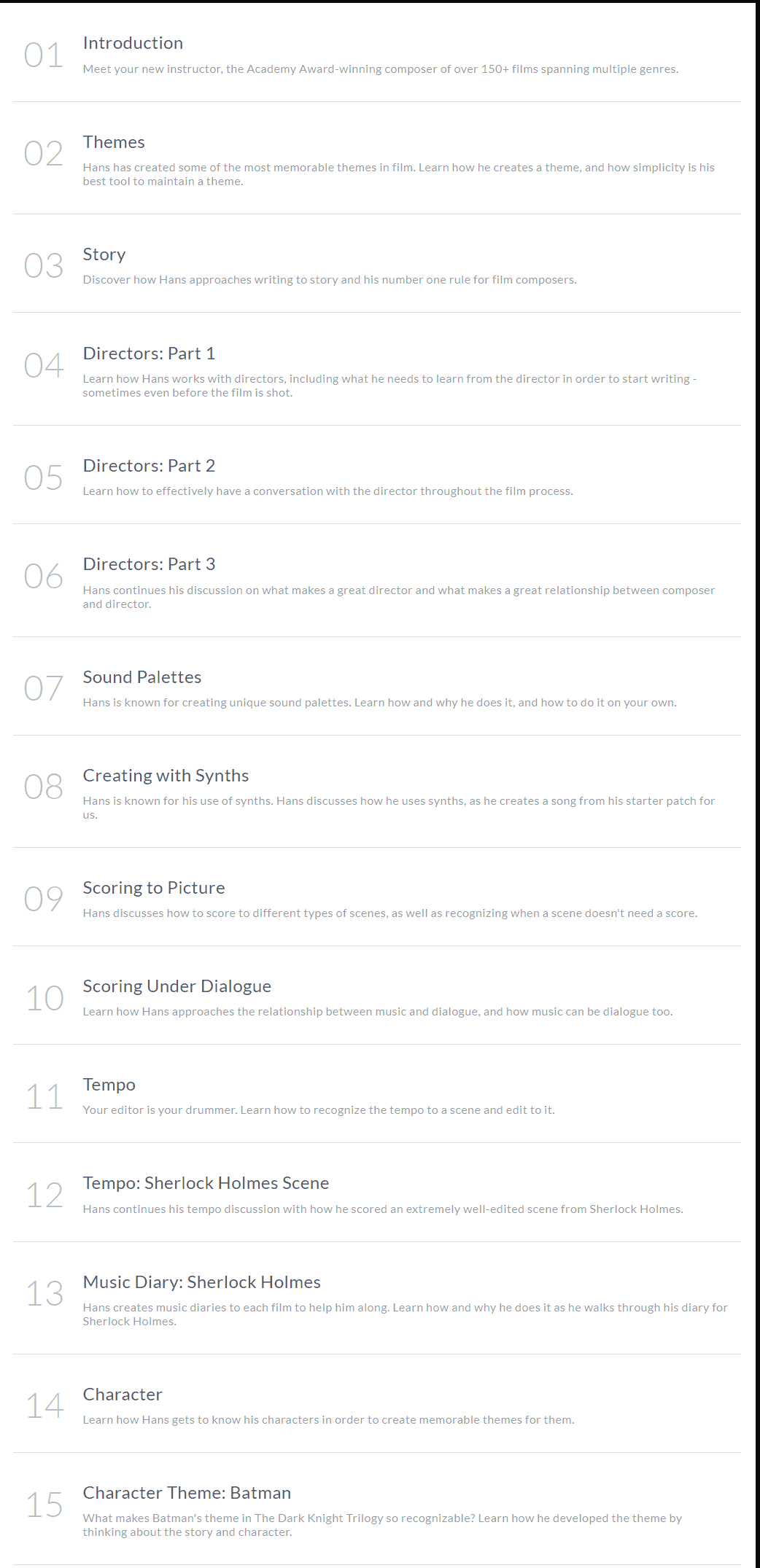
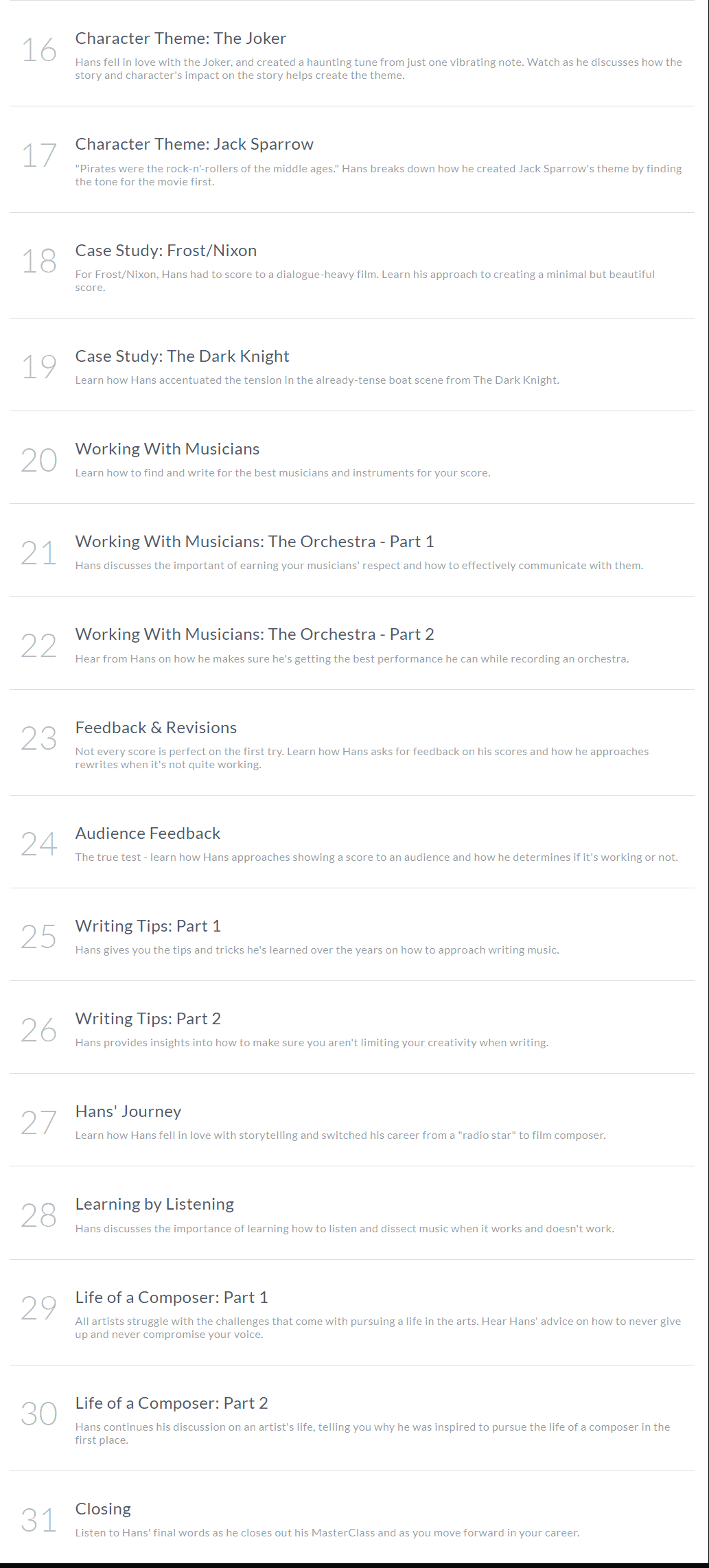
The lessons will remove any sort of doubt in your mind and will remove all the obstacles in your way of becoming a music composer.
The patience to go through all these lessons will prevail at the end of the day, and you might be able to reap the benefits of it as well.
Some of the most important lessons of Hans Zimmer’s Masterclass are as follows:-
Themes
Making simple themes is the very basic step in music composition. Hans Zimmer tells you the importance of making a simple theme.
If you don’t understand how to make a simple theme, how can you expect yourself to produce music on a grand stage without any fuss? That’s never going to be an easy situation for you since you might not even understand the basics of music.
Only if you go through the basics can you create something that can make everyone go gaga about your work. To reach the top of the ladder, you need to make steps from the very bottom. That’s exactly how music composition works, as well.
You can’t jump into a great composition straight away. Once you make simple themes, you’ll be able to understand the music better. Once your doubts are clear, you can make any music regardless of what the genre of the film really is.
Hans Zimmer stresses the fact of making simple themes.
Working with a director
Working with a director’s film is the baby of a director. When you make music for any kind of film, the importance of communicating with the director is second to none. The director will throw his notions at you and tell you exactly what he needs with the music.
If you have detailed conversations with the director, you will be able to get the music in the right chord as well. Hans Zimmer has had some really good moments with his directors.
With Christopher Nolan, who’s considered one of the most brilliant directors in the entire world, he has worked on numerous occasions. He composed the music for The Dark Knight, Inception, and Interstellar.
Each film was a classic on its own, and that had a lot to do with how Nolan and Zimmer approached each other. We’re comfortable with each other’s desires regarding the composition of the music in those films.
One of the greatest strengths of this film is how well Zimmer worked with his director, Christopher Nolan.
Sound palette
South Palette refers to the board that a music composer uses in order to mix the tone of the music in a film. It’s technical work, and to understand Sound Palette, you need to have proper knowledge of music.
In this lesson, Hans Zimmer stresses how Sound Palette should be used. The tone of the music has to follow the tone of the film. If the tone of the film is a comedy and you produce intense music, it will be a haywire situation.
Hence, it becomes important to understand particular notions. Sometimes, the most important scenes of the film get ruined because the music is not according to the tone of the film.
It has happened with a lot of directors, and at the end of the day, they have no one else to blame but the music composers who could have done a better job with the music of the film.
The tone of the music has a lot to do with the instrument you’re using for the film as well. It might be guitar, it might be drums, it might be vocals, or it might be bass.
As long as the instrument handles the music nicely, it doesn’t really matter which instrument you use. But the choice has to do a lot with your instincts regarding the film, and Hans Zimmer tells you exactly that in this lesson.
He believes you should have your own argument regarding what the film’s tone is so you can create your music accordingly!
Film Scores
The film score is basically the background music of the film. A film has music that has vocals and a varied number of songs as well. But the more regular use of music is in the score of the film.
Hollywood films barely have songs attached to them. They are more about the background score.
Thus, a musician’s basic motive with his music is to score the background music in such a way that people can engage in the film, and it also does justice to the type of film and the tone of the film.
If the film score is not done neatly, it lands the film with a hell of a lot of problems as people cannot connect to the film score.

Hans Zimmer is an absolute genius in film score, and he understands the exact use of it. In this lesson, he tells his own theories and principles regarding the film score and what music should be used for a particular kind of film.
Understanding tempo
Unless you understand the tempo of the film, it’s very hard to make the music as well. Hans Zimmer believes that no matter what your director says about the music he wants for the film, it’s up to you to understand the tempo of the film at the end of the day.
You need to have your own theories regarding the tempo. You need to feel the film and feel what should be the apt music for that sort of film.
If you fail to analyze the tempo of the film, you’re going to fail all the way through, even if you understand the clear instructions of your director.
Once you understand the tempo, it is on your knowledge regarding music to channel what you feel into what people hearing the music should feel as well.
It’s a process that takes time, but if people can understand it, the complexities surrounding music might drop down as well.
Collaborating with orchestras
Hans Zimmer stresses that every music composer has to understand that he can’t make the music of the film all on his own.
It has a lot to do with the people that surround him and how well he can use those people and their sense of music in order to create an everlasting impression.
Thus, every music composer needs to walk up to orchestras according to his will and make them understand the way you want the film’s music to look and further create an impression regarding the use of different instruments.
A guitarist knows about guitar tunes more than anyone else, and the same goes for a guy who is a drummer. So you need to walk up to whichever instrument you want to use and convey the way you want your music to be.
Collaborating with orchestras will make your music even more effective and will channel even more senses into its capacity as well.
Life as a composer
Hans Zimmer feels that you need to know exactly how your life as a composer should be. The interests that you have should be noted down in the first place, and you need to look into the future as well.
You shouldn’t just be thinking about a film at a time, but you should rather be focusing on what awaits you in the future as a music composer.
It’s really a hard pill to swallow, but Hans Zimmer feels if you want to become one of the greats in music, you need to think a lot differently.
Thinking differently doesn’t mean you completely escape from your usual personality as a music composer; it rather stresses the fact that you might be a great composer, but there’s still a lot left in the tank.
Usually, a music composer makes a good composition and then gets lost in the shuffle. The thing with music is that people hardly remember you. They will remember the director, the actor, the singer, and the cameraman, but music composers barely make a name for themselves.
Thus, you cannot take one film at a time. You need to ensure the composition of that film makes room for a lot more films in the near future as well.
What I liked About Hans Zimmer MasterClass Review
If you were to ask absolutely anyone to select their top 10 film scores, I have no doubt that at least half of them would be composed by Hans Zimmer.
His insight into everything having to do with film music is extremely significant due to the fact that he has a profound understanding of narratives and how to convey those narratives via music.
Throughout the entirety of the course, you will be deconstructing not just any film scores but the film scores themselves. Gladiator. Inception. The Batman: The Dark Knight. Lion King. The movie is known as Pirates of the Caribbean.
It offers a one-of-a-kind look at the process of creating some of the most iconic film scores in the history of the globe.
Take a look at Hans’ musical journal.
Hans Zimmer walks through his compositions and talks about them. You will have the opportunity, in a few of the lessons, to glance over Hans’ shoulder and take a look at his music diary. This is the site where Hans has written all of his famous music and lyrics. Incredible.
Hans plays samples and demonstrates how one idea can grow into another later on, as well as how he crafts bits and pieces here and there to make a full movie soundtrack by showing how one idea might morph into another later on.
An incredible opportunity that I never would have dreamed of having, like looking through the music journal of someone like Hans Zimmer, has presented itself to me.
How Much Is It Worth?
To join Hans Zimmer’s MasterClass, you need a MasterClass membership. The Standard plan is $180 a year, giving access to over 180 courses, including classes by Alicia Keys and Werner Herzog.
For extra features like downloading courses and watching on multiple devices, the Plus plan is $240 per year for two devices, and the Premium plan is $273 per year for up to six devices.
Quick Links:
FAQs | Hans Zimmer MasterClass Review
Masterclass has some of the best A-class teachers like Bob Iger teaching business, Aurel Stein teaching writing, and the list continues. Just demand a course and they have in their list along with the best teachers.
Masterclass All-Access Pass is billed at $180 and comes with a 30-day moneyback guarantee.
With MasterClass, you can learn and be inspired anytime, anywhere, including your smartphone, personal computer, Apple TV, Amazon Fire TV, and Roku streaming media players. You can even download your favorite lessons and watch on the plane or listen during your commute in audio-only mode
Their goal is to make sure that you have the best learning experience possible. If MasterClass isn’t for you, then email them within 30 days of the date you purchase your subscription. They’ll offer a full refund.
There are total 31 videos of about total 6 hrs
Hans Zimmer is one of the greatest music composers in recent times. Hans Zimmer has scored for some of the greatest hits in the past few decades. 💁 What is a Masterclass?
🤑What is the pricing of Hans Zimmer masterclass ?
📺 Where can I watch Hans Zimmer Masterclass?
🤷♀️ How does the 30-day guarantee work?
✔️ How Many videos are available in Hans Zimmer MasterClass ?
🤔 Who is Hans Zimmer ?
Is It Really Worth What You’re Paying For It?
After years of looking for genuine motivation to write my own soundtracks, I finally decided to purchase Hans Zimmer MasterClass,
as he is both my all-time favorite musician and one of the most influential composers in the history of music.
This course is appropriate for composers of all ability levels and has assisted me in developing my abilities as well as composing my own soundtracks.
If you are interested in expanding your basic knowledge relating to scoring film music, I would personally recommend that you enroll in this course. It is geared toward film composers and aspiring film composers.
Conclusion:
Music composition seems very complex on paper, and it might even be the most complex on the film set, but one thing is for sure: the music of a film makes or breaks the film.
To give the credit that’s due to various composers scoring the word, film composition fails 1 or 2 out of 100 times, and that itself tells you how professional and efficient music composers are across the world.
Hans Zimmer Masterclass helps you grow not only as a music composer but as a part of filmmaking as well. He stresses the fact that film is as much of yours as it is of a director.
If you feel that way, you will hardly have any problems regarding the composition. Having a great relationship on set with your director is very important, and you need to understand his thinking process. Once you do that, you make up your own mind and produce the music.
People are very critical of the music of the film in today’s day and age.
If they like the music of a film, they let everyone know it. Hans Zimmer has seen those times when people have showered their love for him and his music.
Hard work and dedication are a big part of any profession. In music, it doesn’t differ much, either.
But music doesn’t physically hurt you; it’s the mental blocks of it that you need to get rid of as a music composer. Once you do that, the sky is the limit!

